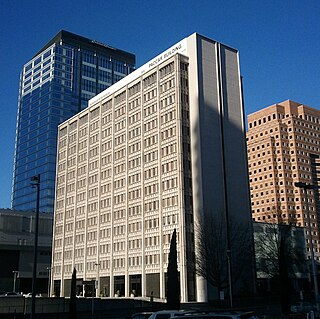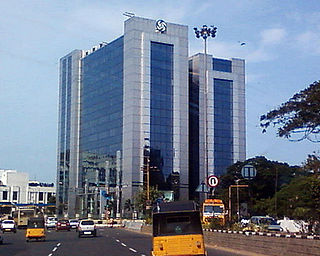The Volvo Group is a Swedish multinational manufacturing corporation headquartered in Gothenburg. While its core activity is the production, distribution and sale of trucks, buses and construction equipment, Volvo also supplies marine and industrial drive systems and financial services. In 2016, it was the world's second-largest manufacturer of heavy-duty trucks with its subsidiary Volvo Trucks.

The Hyundai Motor Company, often referred to as Hyundai Motors, and commonly known as Hyundai, is a South Korean multinational automotive manufacturer headquartered in Seoul, South Korea, which was founded in 1967. Currently, the company owns 33.88 percent of Kia Corporation, and fully owns two marques including its luxury cars subsidiary, Genesis, and their electric vehicle brand Ioniq. The three brands altogether make up the Hyundai Motor Group.

MAN SE was a manufacturing and engineering company based in Munich, Germany. Its primary output was commercial vehicles and diesel engines through its MAN Truck & Bus and MAN Latin America divisions, and participation in the manufacturer Sinotruk.
Iveco S.p.A., an acronym for Industrial Vehicles Corporation, is an Italian multinational transport vehicle manufacturing company with headquarters in Turin, Italy. It designs and builds light, medium, and heavy commercial vehicles. The name IVECO first appeared in 1975 after a merger of Italian, French, and German brands. Its production plants are in Europe, China, Russia, Australia and Latin America and it has about 5,000 sales and service outlets in over 160 countries. The worldwide output of the company amounts to around 150,000 commercial vehicles with a turnover of about €10 billion.
The automotive industry in the United Kingdom is now best known for premium and sports car marques including Aston Martin, Bentley, Caterham Cars, Daimler, Jaguar, Lagonda, Land Rover, Lister Cars, Lotus,MG, McLaren, Mini, MOKE, Morgan, Rolls-Royce and TVR. Volume car manufacturers with a major presence in the UK include Nissan, Toyota, BMW, and Vauxhall Motors. Commercial vehicle manufacturers active in the UK include Alexander Dennis, Dennis Eagle, IBC Vehicles, Leyland Trucks, TEVVA and London Electric Vehicle Company.

Paccar Inc. is an American company primarily focused on the design and manufacturing of large commercial trucks through its subsidiaries DAF, Kenworth and Peterbilt sold across markets worldwide. The company is headquartered in Bellevue, Washington, in the Seattle metropolitan area, and was founded in 1971 as the successor to the Pacific Car and Foundry Company, from which it draws its name. The company traces its predecessors to the Seattle Car Manufacturing Company formed in 1905. In addition to its principal business, the company also has a parts division, a financial services segment, and manufactures and markets industrial winches. The company's stock is a component of the Nasdaq-100 and S&P 500 stock market indices.
The automotive aftermarket is the secondary parts market of the automotive industry, concerned with the manufacturing, remanufacturing, distribution, retailing, and installation of all vehicle parts, chemicals, equipment, and accessories, after the sale of the automobile by the original equipment manufacturer (OEM) to the consumer. The parts, accessories, etc. for sale may or may not be manufactured by the OEM.

Tata Motors Limited is an Indian multinational automotive company, headquartered in Mumbai and part of the Tata Group. The company produces cars, trucks, vans, and busses.

Ashok Leyland is an Indian multinational automotive manufacturer, with its headquarters in Chennai. It is now owned by the Hinduja Group. It was founded in 1948 as Ashok Motors, which became Ashok Leyland in the year 1955 after collaboration with British Leyland. Ashok Leyland is the second largest manufacturer of commercial vehicles in India, the third largest manufacturer of buses in the world, and the tenth largest manufacturer of trucks.

ZF Friedrichshafen AG, also known as ZF Group, originally Zahnradfabrik Friedrichshafen, and commonly abbreviated to ZF, is a global technology company that supplies systems for passenger cars, commercial vehicles and industrial technology. It is headquartered in Friedrichshafen, in the south-west German state of Baden-Württemberg. Specializing in engineering, it is primarily known for its design, research and development, and manufacturing activities in the automotive industry and is one of the largest automotive suppliers in the world. Its products include driveline and chassis technology for cars and commercial vehicles, along with specialist plant equipment such as construction equipment. It is also involved in the rail, marine, defense and aviation industries, as well as general industrial applications. ZF has 162 production locations in 31 countries with approximately 168,700 (2023) employees.
This article provides an overview of the automotive industry in countries around the world.
Dongfeng Motor Corporation Ltd. is a Chinese state-owned automobile manufacturer headquartered in Wuhan, Hubei. Founded in 1969, it is currently the third largest of the "Big Four" state-owned car manufacturers of China, namely: SAIC Motor, FAW Group, Dongfeng Motor Corporation, and Changan Automobile, with car sales of 5.37 million, 3.50 million, 3.28 million and 2.30 million in 2021 respectively.

Automotive production is a significant industry in Russia, directly employing around 600,000 people or 1% of the country's total workforce. Russia produced 1,767,674 vehicles in 2018, ranking 13th among car-producing nations in 2018, and accounting for 1.8% of the worldwide production. The main local brands are light vehicle producers AvtoVAZ and GAZ, while KamAZ is the leading heavy vehicle producer. Eleven foreign carmakers have production operations or are their plants in Russia.

Ford Motor Company is an American multinational automobile manufacturer headquartered in Dearborn, Michigan, United States. It was founded by Henry Ford and incorporated on June 16, 1903. The company sells automobiles and commercial vehicles under the Ford brand, and luxury cars under its Lincoln brand. Ford also owns a 32% stake in China's Jiangling Motors. It also has joint ventures in China, Taiwan, Thailand, and Turkey. The company is listed on the New York Stock Exchange and is controlled by the Ford family; they have minority ownership but the majority of the voting power.

The Renault–Nissan–Mitsubishi Alliance, originally known as the Renault–Nissan Alliance, is a French-Japanese strategic alliance between the automobile manufacturers Renault, Nissan and Mitsubishi Motors, which together sell more than one in nine vehicles worldwide. Renault and Nissan are strategic partners since 1999 and have nearly 450,000 employees and control eight major brands: Renault, Nissan, Mitsubishi, Infiniti, Renault Korea, Dacia, Alpine, and Venucia. The car group sold 10.6 million vehicles worldwide in 2017, making it the leading light vehicle manufacturing group in the world. The Alliance adopted its current name in September 2017, one year after Nissan acquired a controlling interest in Mitsubishi and subsequently made Mitsubishi an equal partner in the Alliance.
Bernard Krone Holding SE & Co. KG is an agricultural technology and commercial vehicle manufacturer based in Spelle in the Emsland district, Lower Saxony. The company acts as the parent company and corporate headquarters of the Krone Group. The Krone Group is wholly owned by the Krone family.
Kögel Trailer GmbH & Co.KG is one of the largest manufacturers of commercial vehicles, amongst other things for trailers and semi-trailers. It had its headquarters in Gersthofen and was founded in 1934 by Franz Xaver Kögel.

Belarus had third by volume part of automotive industry of the Soviet Union with near 40,000 annual production. Since that times Belarus specializes on production of own designed superheavy, heavy and middle trucks mainly plus post-Soviet developed buses, trolleybuses and trams. Auto manufacturers in Belarus include MAZ, BelAZ and Neman.

As of 2019, the automotive industry in Thailand is the largest in Southeast Asia and the 10th largest in the world. The Thai industry has an annual output of more than two million vehicles, more than countries such as Belgium, Canada, the United Kingdom, Italy, Czech Republic and Turkey.
Schwarzmüller Group, is an Austrian supplier of towed commercial vehicles.














